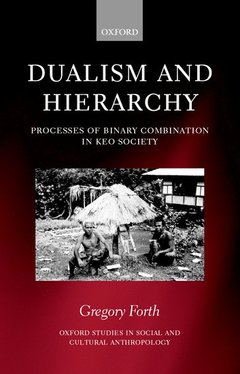Description
Dualism and Hierarchy C
Processes of Binary Combination in Keo Society
Oxford Studies in Social and Cultural Anthropology Series
Author: Forth Gregory
Language: English
Subject for Dualism and Hierarchy C:
Publication date: 05-2001
360 p. · 16.5x24.3 cm · Hardback
360 p. · 16.5x24.3 cm · Hardback
Description
/li>Comment
/li>
Society in the Keo region of the eastern Indonesian island of Flores reveals a pervasive pairing of villages, clans, and other groups. Apart from introducing a hitherto undescribed population, this study, deriving from fieldwork conducted by the author over a period of 15 years, analyses a form of society that has occupied anthropologists since the inception of their discipline: morphological dualism, or dual organization. Drawing on a notion of encompassment inspired by Dumont's theory of 'hierarchy', the author interprets dualistic social forms as products of a continuous process of combination and a tendency to create binary wholes through the partial assimilation of junior by senior partners. While Keo exemplifies a variant of a widespread eastern Indonesian pattern of binary classification and asymmetric marriage alliance, the analysis shows how Keo morphological dualism cannot be reduced to the categories of a dual classification nor to unique or exclusive forms of reciprocity or functional complementarity. Exploring these issues through original ethnographic studies of numerous Keo domains and settlements, the book is of critical relevance not just to dualism, but to a variety of continuing concerns in contemporary social anthropology, including the concept of 'descent', the social construction of inequality, and connections between ritual practice (especially animal sacrifice), and social order.
© 2024 LAVOISIER S.A.S.

